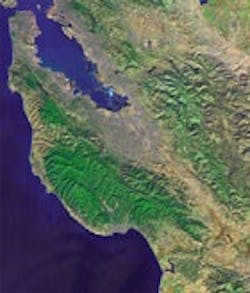Settlement Reached to Protect San Francisco Bay from Wastewater Discharges
The U.S. Environmental Protection Agency (EPA), along with the California State Water Resources Control Board and the San Francisco Bay Regional Water Quality Control Board, have reached a settlement with the East Bay Municipal Utility District (EBMUD) to take steps to address inadequately treated sewage discharges to the San Francisco Bay during wet weather.
EBMUD's three wet weather facilities handle excess sewage during storms when flows exceed the capacity of the district's main wastewater treatment plant. The excess flow is caused by storm water and groundwater leaking into the region’s aging sanitary sewer pipes and through improper connections that channel storm water flow into the sanitary sewer system. Discharges from the wet weather facilities to the Bay, which are only partially treated, will no longer be allowed under a new regional board-issued permit that was adopted Jan. 14.
The order requires EBMUD to begin the studies and improvements needed to eliminate discharges from the wet weather facilities.
“EBMUD has stepped forward with a meaningful commitment that will yield long lasting improvements to the East Bay wastewater system and important protections for the Bay,” said Alexis Strauss, the EPA’s Water Division director for the Pacific Southwest region. “Today’s action lays the groundwork for substantial infrastructure improvements by EBMUD and the East Bay cities to replace aging sewer pipes and eliminate discharges of partially treated sewage to the San Francisco Bay.”
“The stipulated order and the board's permit work together to spell out the initial work EBMUD must do to cease its discharges of partially-treated wastewater,” said Bruce Wolfe, executive officer of the San Francisco Bay Regional Water Board. “We look forward to working with EBMUD, the other state and federal agencies, and the East Bay community in making sure the work needed to stop the discharges is environmentally effective and cost efficient.”
Under the order, the EBMUD is required to: develop a program requiring repair of leaking private sewer pipes that extend from homes and businesses to city sewer mains; spend at least $2 million annually in incentives to accelerate repair of private sewer pipes; develop improved maintenance and repair programs for its sewers and the sewers of the contributing cities; and deploy flow meters throughout the East Bay sewer network, identify areas with the highest wet weather sewage flows and identify areas for sewer repair and flow reduction.
These programs will reduce infiltration and inflow of storm water and groundwater into sewer pipes during winter storms. Infiltration and inflow results from misconnections, cracks and other imperfections in system pipes, joints and manholes, and can lead to a 10-fold increase in the volume of wastewater that reaches EBMUD’s sewer interceptor pipes and wastewater treatment plant.
The order will provide data that identifies problem areas and will lay the groundwork for a future settlement to eliminate discharges from the wet weather facilities. The EPA expects a final remedy, which will include EBMUD and the contributing cities, to be developed in the next several years based on the data gathered and the work initiated under the order.
The settlement, lodged today in U.S. District Court for the Northern District of California, will be available for a 30-day public comment period before the U.S. seeks court approval of the settlement.
EBMUD operates a large sewage treatment plant, three wet weather treatment facilities and major interceptor lines that transport sewage collected from seven East Bay contributing cities that include Oakland, Berkeley, Alameda, Albany, Piedmont, Emeryville and the Stege Sanitary District, and serves a total population of approximately 650,000. The wet weather discharge facilities are located at Point Isabel and at two locations on the Oakland Estuary.
For more information, visit: www.epa.gov/region09/water/npdes/compliance.html.
Source: EPA
